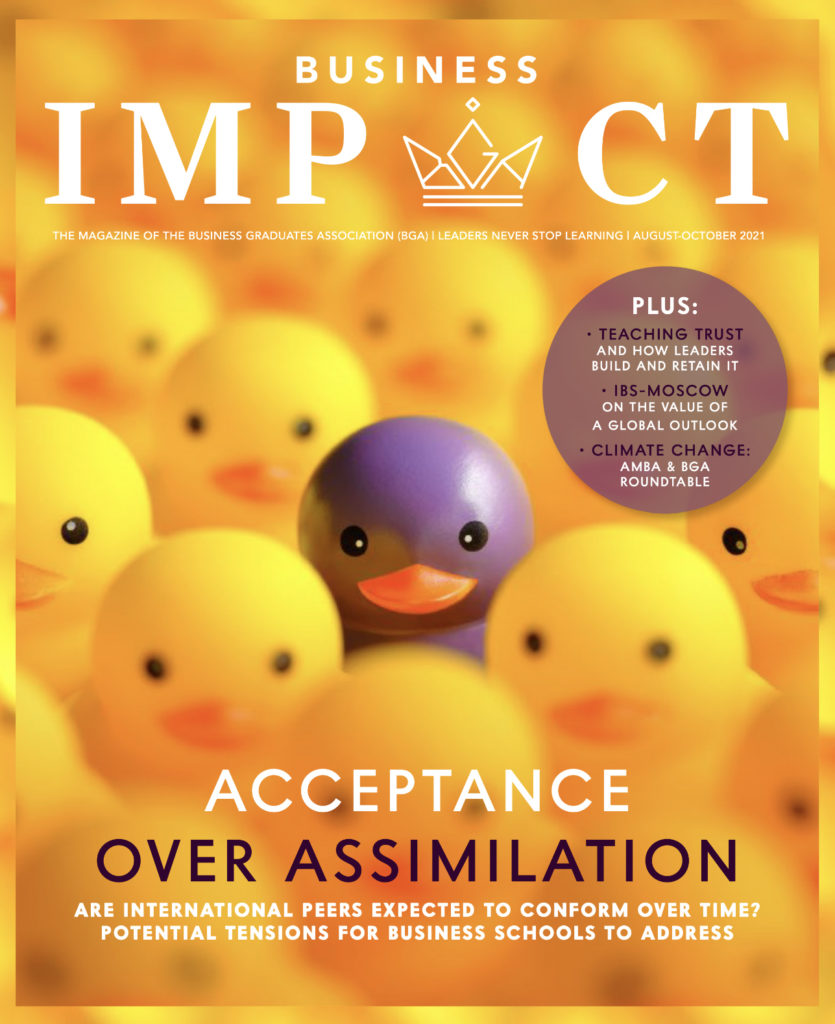At Macquarie Business School, the emphasis is on making business education truly relevant to industry, government and future society, explains Eric Knight, Executive Dean and Professor of Strategic Management. Interview by David Woods-Hale
In 2021, Macquarie Business School at Macquarie University in Sydney, became one of four Schools in Australia to be accredited by BGA’s sister organisation, AMBA.
The School, which was established in 2019 and is the single point of delivery for all business, management and economics teaching and research activities at Macquarie University. Its Global MBA programme was launched in response to the changing demands of the global MBA market and draws upon new learning technology. As such, the School is known among employers and students as the place to be for real-world application and employer-relevant skills.
In this interview, Macquarie Business School’s Executive Dean, Eric Knight, discusses the innovation and achievements of the School, its plans for the future, as well as his own thoughts on the economic climate and opportunities for business education.
What are the biggest challenges facing Business Schools?
Business Schools will be impacted by the changes in the global economy and global/local jobs markets. In that respect, the kinds of challenges facing businesses map against those of international Business Schools as they tailor their offerings to where students need skills. It is important that Business Schools can respond to the challenges to ensure the next generation of business leaders can manage through these changing times.
The employment skills required for professional success are changing: effective communication, data analytics, critical thinking, and problem solving are all now valued. That is why we devised our Global MBA, in partnership with Coursera, around a set of skills rather than traditional disciplinary domains. That programme has proved very popular and has just been ranked second in Australia and 19th globally by QS in the 2021 Global Online MBA Rankings, after launching in 2019. It is also ranked first in the world for ‘class experience’.
The nature of learning is also changing, and it is now essential that Business Schools provide a quality online experience for all students. Students are also looking for shorter learning experiences and life-long learning opportunities that allow them to build successful careers. Macquarie Business School is responding to the challenges with courses that are co-designed with industry to help students get the very best education they can.
For example, our partnership with the Australian Financial Markets Association offers micro-credentials that feed into our master’s of applied finance programme. With workplaces and the future of work evolving so rapidly, careers options for our students are very different to just five or 10 years ago. This is our great responsibility and privilege – to help students find their way into the world.
What do you think differentiates the MBA at Macquarie Business School?
Quality. We have a solid foundation of high-quality teaching and research and our long-term vision is to focus on relevance in the world and to industry and government, for whom we prepare the future workforce.
Our MBA provides a transformative learning experience, building strategic business acumen and leadership capability to accelerate career progress within or across industry. It is tailored to student learning, work and career needs by addressing:
• Essential and contemporary business discipline knowledge and skills.
• The integrated application of business disciplines in key units, culminating in the MBA capstone unit.
• Business disciplines in practice via the Industry and Alumni Partnership Program integrated in the curriculum.
• Business disciplines applied to student work and career needs through the Career and Coaching Program.
• Environmental, social, and governance (ESG) principles integrated in the curriculum.
Our Global MBA is built around six future-focused capabilities: adapting, analysing, influencing, leading, problem solving, and strategising. It is designed to meet the changing needs of the labour market, where increasing tech-driven disruptions redefine and create new opportunities for work. It is modelled on a stackable concept where you determine what you’ll learn, how much you’ll learn, and when you’ll learn.
For both, we work in collaboration with our alumni and corporate partners to provide a world-class education that is applied and engaged in the challenges we face in society and in our economy. Business and business education are being disrupted as never before by globalisation and rapid technological change.
How are you future-proofing your School’s postgraduate Business programmes?
The year 2020 was a challenge for us all, and at Macquarie Business School, we saw exceptional efforts from staff to deliver high-quality teaching and student experience, despite the challenges presented by the global Covid-19 pandemic.
Our courses are co-designed with industry, meaning our degrees are reflective of industry realities and future demands. Students graduate with the skills and knowledge they will need to meet the current and future challenges of their chosen profession.
We work to create innovative, engaging, and impactful learning experiences for our students. This includes work-integrated learning at scale, flexibility in delivery, future-focused curricula and an enriched and engaged student experience.
Our focus on work-integrated learning at scale has been affected by Covid-19 interruptions. There are now opportunities to extend employability, mentoring at scale and with alumni, and more work-integrated learning using digital modalities and technology.
In response to the global challenge of finding ways to provide access to digital skills learners from around the world, Macquarie Business School created a set of courses on Excel Skills for Business. The seemingly mundane topic remains a key skill to acquire for anyone looking for work. With the surge of interest in data analysis, Excel remains a critical digital ‘door-opener’ skill in a rapidly growing segment of work. In partnership with Coursera, we launched four Excel Skills for Business courses that have since attracted more than 150,000 learners from across the globe.
Do you think the business education sector, as a whole, is responding quickly enough to this disruption?
Last year meant a rapid move to online learning for our students. Our staff made a tremendous effort and commitment to achieving a positive experience for our students. Across the sector, in response to the disruptions we have experienced, there is significant work underway to provide students with the skills necessary to manage through disruption.
The interface with Technology and STEM is crucial to the future of business research and education. This is why we offer a Master of Business Analytics which is cross taught between Macquarie Business School and our Faculty of Science and Engineering. It’s a great programme, and shows the power of multi-disciplinary education as we begin to think about the education of the future.
How is technology continuing to impact Business Schools in the wake of Covid-19?
Covid-19 has prompted a reimagining of how, when and where we deliver education to our learners. The opportunity now is to move to a hybrid model, capturing the best of online and in-person, synchronous and asynchronous learning, while also optimising student engagement, connection and collaboration.
For example, Macquarie Business School is partnering with Forage to deliver in-curriculum virtual work experience to students on our post-graduate courses. Covid-19 has meant that many students have had difficulty accessing work experience in the real world. Forage bridges a critical gap by providing a platform that allows organisations to bring real-world career experience to students through bite-sized virtual experience programmes.
Is there a reluctance on the part of Business Schools to introduce too much change into their programmes?
Not really. We have increasingly given responsibility to course directors to guide us on where programmes need to head, and our academic colleagues apply their judgement across disciplinary context, commercial understanding, and student need.
MBAs care about sustainability and climate change. How important is sustainability, and in what ways have Business Schools adapted this into their programmes?
Sustainability and social responsibility are embedded throughout the curricula of our MBA and GMBA. The GMBA also has the standalone subject ‘Global sustainability and corporate social responsibility: Be sustainable’. In alignment with the United Nation’s Sustainable Development Goals, other subjects in the degrees pick up on critical themes such as resilience, diversity, inclusion, and meaningful work.
The publication of Industry and Higher Education – Case Studies for Sustainable Futures positions Macquarie Business School as a thought leader in sustainable business education. The book investigates how industry and higher education can work together to create sustainability in business, and analyses international cases of industry and university interaction as a mutually beneficial symbiosis, promoting innovative and sustainable business practices.
Given the 2020 fires in Australia, do you think Business Schools have a role a play in helping communities to respond to natural disasters?
Business Schools have an essential role in equipping our student community with the skills and knowledge necessary to deal with such disasters, and to face the challenges of our world.
Macquarie Business School works hard to give students the skills to solve real-world problems. Our students will need agility and resilience to deal with shocks that occur to the economy and to respond to these effectively.
What do you think sustainable leadership looks like?
I think of sustainability of others, and sustainability of self. Sustaining others means linking into the central, enduring, and distinctive aspects of people’s motivation to be part of the organisation. Sustainable leaders need to tap into this and nurture it. Sustaining the self means being clear about one’s values and managing time carefully to maintain one’s health and mental energies.
As a leader in the field of design-led strategy, could you tell us about your work and research in this area?
Design-led strategy represents a fundamentally new way of thinking about strategy, which brings customer perspective into the boardroom. It’s the opposite of traditional strategy, which starts with the hypotheses (and sometimes the biases) of top management.
This way of formulating strategy is more relevant to our modern age where there is need for enhanced data from customers, and increased ways of collecting it.
We need new approaches to strategy, informed by speed, agility, and the ability to work at the intersection of business, science, and engineering. Design-strategy, and my course on Coursera covering this, offers a way to respond.
Given ongoing VUCA disruption, do you think the concept of ‘strategy’ we adopt in businesses around the world needs to be reconsidered and replaced?
One of the most dynamic and exciting fields is that of strategy. Strategy, by definition, is about the future. Modern strategy now calls for something more: the ability to think and feel, to analyse and intuit, and to act and react.
We are beginning to realise that strategy is more than what you intend to do. It is just as much about how you respond to the unexpected. Covid-19 has put this in sharp relief, but it is by no means the exception.
Every crisis, whether it be an environmental disaster, reputational threat or financial precarity, must be understood in terms of the preparedness of the executive – how well have they already considered all possible outcomes, intuited the future, covered off all contingencies and unpredictable ‘black swan’ events?
Therefore, design-led strategy is important – now more than ever. Design-led strategy is one approach that executives can adopt to ensure they stay relevant to customers, both today and tomorrow.
We need new approaches to creating strategy that keep up with the fruitful and dynamic intersection of business, science and engineering, and are informed by speed and agility.
Do you think the events of 2020/2021 (from Covid-19 to geopolitical upsets and environmental crises) will lead to short-to-medium term changes in how businesses need to be run?
I think organisations are determined by the energy and motivation of the people who staff them.
The biggest challenge of 2022 will be renegotiating the organisational-staff relationship, as staff (hopefully) return to offices around the world, and also rethinking the nature of flexible work, team building, and remote and digital communication.
How does your School facilitate career opportunities for international students who wish to stay on and work in Australia after graduating?
Our MBA Careers Team provides a range of initiatives to help all our MBA students make important decisions about their career. We provide services such as personalised careers coaching sessions and career development workshops. The aim is to help students develop an individualised action plan to achieve the career they want. We also work very closely with industry partners, prospective employers, and recruitment agencies to bring more internship and employment opportunities to our students and alumni post-graduation.
An example is our LIFT mentoring programme for graduates. This is a free, flexible, and online flash mentoring programme that allows our alumni to engage in multiple mentoring partnerships with our dynamic 90,000-plus Business School alumni.
And what are the next steps for yourself as a Business School leader?
As flagged above, being present for staff as we work through change and recover from Covid-19 is the big issue of 2022. As an education leader, this is also an important issue for our students coming back onto campus.
Getting this right, and making people relaxed, comfortable, and excited to reconnect as we recover from Covid-19, is the top priority.
Do you feel optimistic about the future of business, Business Schools, and the economy?
Absolutely. The great privilege of university life is to come to work every day and look down the pipeline of the future.
We have extraordinary challenges facing our society and economy, but also incredible discoveries. Business Schools play such a vital role in these, offering the economic, financial, communication and organisational skills to realise ideas into action.
Any student wanting to run an organisation, found a company, or be a good colleague will always find something of value and use in a Business School education.
But I also think a business education should be had in combination with other disciplinary knowledge and other worldly skills so that our next generation emerge from their university education as all-rounded, resilient, and multi-disciplinary citizens.
Eric Knight is Executive Dean and Professor of Strategic Management at Macquarie Business School. Previously, he was Professor of Strategic Management and Pro-Vice-Chancellor (Research – Enterprise & Engagement) at the University of Sydney. He earned his DPhil from the University of Oxford, before working for the Boston Consulting Group for several years.
This article is adapted from one which originally appeared in Ambition – the magazine of the Association of MBAs.





























